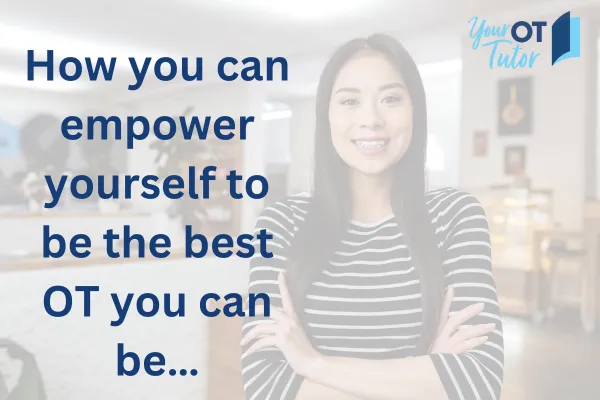THE YOUR OT TUTOR BLOG
Some short articles on important topics for occupational therapists...
Hi, Clare here...I often see recurring questions or topics come up in OT discussion boards or networking events, so I have created some short articles on some of these topics.
Got a question or topic in mind?
If you have a particular topic or question that you'd like me to cover in a blog post, please send me your suggestion via the Your OT Tutor enquiry form and I'll add it to my list!


How you can empower yourself to be the best OT you can be…
OTs go into the profession because they want to help others. But due to a range of factors, we may not look after ourselves. We can quickly forget that sometimes the best thing we can do for our clients is to reflect on and serve our own needs, so we can be the best OT we can be.
In my Your OT Tutor membership – the Your OT Tutor Alliance – I talk about this in the first Foundation of OT Success. Empower Yourself!
Keep reading to find out some of my key tips for how you can empower yourself to be a better OT who loves what they do.
1. Get the most out of your supervision
All OTs need some form of clinical supervision. It doesn’t matter how many years’ experience you have, or how many years you’ve been doing the same caseload for, there are always things you can learn. For new graduates, a mix of regular ad hoc and formal sessions are essential on a weekly basis, while experienced clinicians may opt for more of a peer supervision model.
Supervision can help guide you when you’re lost or doubting yourself, or it can help you realise skill and knowledge gaps you didn’t know you had by pushing you to reflect on, unpack and explain your clinical reasoning. It can also help you accept when you’re not coping with your caseload, or when you’ve lost your interest or passion for what you’re doing.
So we all should be doing it, but there’s things you can do to make sure you are getting the most out of your sessions. As the supervisee you shouldn’t be rocking up to your supervision session expecting your supervisor to lead. Just like you block out time for the supervision session itself, block out some time beforehand to plan for the session. This could involve writing a list of questions, or reflecting on your approach during a particularly challenging client session.
You need to do this prep so your supervisor can work out the best way to help and teach you to help yourself, not just give you the answers. For anyone who needs it, there’s a free downloadable template on the Your OT Tutor website that can help you reflect on a client session before your supervision session.
2. Make sure your CPD is completed based on planning and passion!
One of the best ways to be a better OT is to be a lifelong learner that is committed to building their knowledge and skills. But there are right and wrong ways to go about engaging in CPD. Wrong ways could include:
- Only doing CPD because you’re told you have to – you’re ticking a box, but you have no plan for how you will actually use what you are learning.
- You sign-up for loads of CPD because it sounds interesting at first, but then you realise it doesn’t really fit with how you like to learn.
- You do the CPD, think “that was great!” but then don’t have any clear plan for how that CPD will actually change your practice – so it doesn’t.
The best CPD choices for you will be ones that:
- Are taught in a way you like to learn
- Will fit in with opportunities available within your caseload
- Align with your interests and plans for where you’d like your career to take you, and
- Make it easy to create a clear action plan for how you can actually apply what you have learnt straight away to improve your practice, and in turn client outcomes.
But to find this CPD will need some planning. All OTs in Australia should have some CPD goals as part of their AHRPA CPD evidence, and they should be something you review regularly and update so that they stay applicable to any changes in your role or caseload. If you need help with this planning, my upcoming workshop on CPD Magic for YOTT Alliance members will help you plan, choose, do, and reflect on your CPD – find out more here or send me a DM if you need help with this!
3. Build personal and professional resilience
“There’s never been a better time to be an OT!” You’ll hear this a lot because you can take your pick of where you work – OTs are needed everywhere! But the flip side is that being an OT at the moment is also really tough.
Yes, it’s relatively easy to find a job because OTs are in demand, but with that comes busy caseloads because you may find yourself in a team that is understaffed and under the pump. Add to this that many OTs, especially new graduates, are working in challenging caseloads with high levels of variety and complexity, within systems that are broken. All this while dealing with the pressure of meeting KPIs that don’t align with why we became OTs in the first place, for managers that may not truly understand the nature of what we do, while the media portrays us in a way we know is not true for the majority.
With all this, it’s not surprising that burnout rates are high, and that OTs are changing jobs or leaving the profession completely. For some a few self-care hacks might get you through, but most will need much more than this. You’ll need a range of strategies to help you build both personal and professional resilience, and you’ll need to recognise and accept that what works for one OT won’t necessarily work for you, and if it doesn’t, that it’s not your fault.
I’ll admit that helping OTs through burnout is not my area of expertise – but luckily, I know lots of awesome OTs who are experts in this area. And the great thing is that they all have different approaches and recognise that one size won’t fit all. I was lucky enough to pull many of these wonderful OTs into one webinar last year to chat through what we can be doing to look after ourselves, and it’s too important a topic not to share. You can access the recorded webinar via the Your OT Tutor website for FREE here.
4. Choose the RIGHT job for you
For those that watch the webinar, it may lead you to the realisation that your workplace isn’t the right place for you. Or maybe you’ve made that realisation already and are about to jump ship. Maybe you’ve already jumped ship a few times in the last couple of years and are just crossing your fingers that this time will be different.
A big contributing factor to burnout is working in a role that doesn’t align with your values, give you a ‘just right’ challenge, or make you feel happy or excited about going to work (at least most days!). You may be in a job where you’re not happy and you’ve decided to leave – but just take a few minutes before you do to unpack why you’re not happy. Is it the caseload, the team, the expectations, the opportunities?
If you don’t stop to think about this, chances are you’ll choose a new job that actually has the same issues, it just seemed ‘different’ or ‘better’ on the surface. Or you may leave a job that could have actually been perfect for you, you just needed to realise what it was that you were missing and be brave enough to have a conversation with your manager to ask for it. Don’t worry – I’ve got a resource for this situation too 😉 It’s called the “Choosing the RIGHT OT job for me” workbook and recorded webinar. It’s free, it’s on the website, and you can access it here.
5. Find your people
My final tip is to find your people – your OT people. Being a better OT who loves what they do will be much harder if you try to figure things out on your own. I’m a huge introvert (seems funny for someone with 9000+ LinkedIn followers to say!) but even I need some people. You’ve just got to find the right ones.
The good news is that there are lots of online and face-to-face OT communities to choose from, including interest groups on niche topics to larger online communities of practice within Facebook and other platforms. The bad news is that sometimes it can be trial and error to find the right fit.
Some groups you join and at first, you’re addicted – there’s so much information, people share and validate your frustrations and genuinely ‘get’ the challenges you are facing. But over time you feel overwhelmed by too many options, take on other people’s worries too and leave a meeting or scrolling session feeling worse than when you started. A similar thing happened to me when I tried to watch Game of Thrones – watched the first season, the writers mastered the art of leaving you wanting to see what happened next, but pretty soon you realise that much blood, trauma and death isn’t really that fun. So yep, I’m one of the few people in the world that didn’t actually watch every season of GOT.
Sorry, I digressed! But my point is, not all groups or communities will be for you. Reach out to other OTs and find out what groups they are a part of. Join a few different ones and leave the ones that don’t work for you. Or if all else fails, start your own – I know of lots of great OTs who have done this so feel free to hit me up for suggestions if you need them. For those looking, the Your OT Tutor Alliance may be one you want to try. You can find out more here, or let me know if you want to chat more about how I can help you be a better OT who loves what they do.
For those still reading, hopefully there was something there that resonated with you. If it did, jump on the website and get your free resources, send me a DM if there’s something you think I might be able to help with, or join the Your OT Tutor Alliance and get this support on a regular basis.
P.S. Are you still looking for ways to be a better OT that loves what they do? Here are 4 ways that I can help you:
· Check out my Learning Library full of resources and courses
· Sign-up for one-on-one or group training and support
· Book a time for a chat to see how I can help
· Sign-up for Your OT Tutor membership
Have you checked out all my social media platforms for more great FREE content? Click here to find my best stuff! https://yott.au/clarebatkinlinktree
#OccupationalTherapy #NewGraduate #NDIS #YourOTTutor #CPD #Burnout






